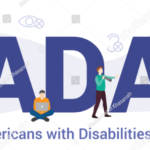ADA violations include discrimination against disabled individuals in employment, public accommodations, transportation, telecommunications, and other areas. Penalties vary depending on the type of violation.
The ADA ensures equal rights and opportunities for individuals with disabilities, spanning public accommodations and digital spaces. While the ADA aims to create a more inclusive society, it also enforces strict penalties for violations to ensure compliance.
Businesses must grasp ADA violation penalties to navigate the legal landscape, dodge fines, and uphold accessibility and fairness principles. This guide explores ADA violation repercussions, emphasizing the significance of adhering to accessibility standards and fostering inclusivity for all.
What Is the purpose of the ADA?
The purpose of the ADA was to ensure that people with disabilities had equal opportunities to participate in society. It also required employers to make reasonable modifications to existing facilities so that people with disabilities could work there.
Enacted in 1990, the ADA is a landmark civil rights law fostering equality, accessibility, and inclusivity for individuals with disabilities. It aims to eradicate disability-based discrimination, ensuring equal rights and opportunities in public life.
The ADA aims to create an equitable and inclusive society. And empowers individuals with disabilities to exercise their rights, achieve aspirations, and contribute equally to their communities. Through promoting inclusivity and recognizing diverse abilities, the ADA strives to build a stronger, fairer nation for all.
History of the ADA
The ADA’s history reflects a path of struggle, determination, and advocacy for the rights of individuals with disabilities. Before its enactment in 1990, people with disabilities faced discrimination and barriers in various aspects of life.
President George H.W. Bush signed the ADA into law on July 26, 1990. He aims to eliminate disability-based discrimination and promote equal opportunities in employment, public accommodations, transportation, and governmental services.
While progress has been made, ongoing efforts are needed for full inclusion and equal access. Nonetheless, the ADA remains a pivotal piece of legislation, a historic milestone in the ongoing struggle for disability rights. And also a testament to collective advocacy for a more inclusive society.
The ADA protects people with disabilities
A person with a disability is someone who:
- has a physical or mental impairment that substantially limits one or more major life activities,
- has a history or record of such an impairment (such as cancer that is in remission), or
- is perceived by others as having such an impairment (such as a person who has scars from a severe burn)
If a person falls into any of these categories, the ADA protects them. Because the ADA is a law, and not a benefit program, you do not need to apply for coverage.
The ADA prohibits disability discrimination in many areas of life
The ADA sets out requirements that apply to many of the situations you encounter in everyday life. This is to prevent discrimination against people with disabilities. Employers, state and local governments all have to follow the requirements of the ADA.
The ADA is broken up into five different sections, which are called titles. Different titles set out the requirements for different kinds of organizations. For example, Title I of the ADA covers requirements for employers. Title II covers requirements for state and local governments. You can find the relevant title of the ADA noted next to each type of organization below.
Employment: Title I
Title I applies to employers that have 15 or more employees, including state/local governments, employment agencies, and labor unions. The ADA includes specific requirements for employers to ensure that people with disabilities have equal access to employment. This includes things like recruitment, hiring, promotions, training, pay, and social activities.
The ADA protects qualified individuals with disabilities, mandating reasonable accommodations by employers for essential job functions. This promotes equal employment opportunities and prevents unjust exclusion due to removable barriers.
State and local governments: Title II
Title II ensures equal access to public services for individuals with disabilities by state and local government entities. Discrimination in public services, including transportation and education, is prohibited, allowing all to participate without unnecessary barriers. State and local governments must make reasonable accommodations for all. Except when it fundamentally alters the service, and newly constructed public facilities must be accessible to individuals with disabilities.
Businesses open to the public: Title III
It applies to businesses and nonprofits serving the public, like restaurants and retail stores. The ADA requires them to remove physical and communication barriers. Thus ensuring an inclusive environment for individuals with disabilities to participate in social, recreational, and commercial activities.
Understanding the consequences will help you avoid ADA penalties for noncompliance. It will protect your business reputation while providing the safe and easy access your customers and visitors deserve.
Who Can Sue Under the ADA?
Anyone who has been discriminated against because of a disability can sue under the ADA. This includes employees, job applicants, former employees, current employees, and anyone else who has experienced discrimination based on a disability.
What are the penalties for ADA violations?
If an employer violates the ADA, the employee can file a lawsuit and seek damages. Damages can include back pay, lost wages, compensatory damages, punitive damages, attorney fees, and other costs associated with the violation.
ADA fines for non-compliance
Federal law allows fines of up to $75,000 for the first violation and $150,000 for additional ADA violations. States and local governments may allow additional fines. They may require businesses to meet a higher standard of accessibility than the ADA requires. With these direct penalties looming, it makes sense to invest in ADA compliant websites and digital content.
Lawsuits involving people with disabilities
The ADA prohibits disability-based discrimination in public accommodations, including websites. Government agencies and small businesses must ensure adequate accessibility to avoid lawsuits and penalties. Maintaining compliance is crucial to avoid negative outcomes.
Damage to your business reputation
Perhaps the most financially damaging consequence of non-compliance is the damage to the image of your business or brand. Providing equal access to disabled persons shows that the ethics of your business are of the highest level.
What are some examples of ADA Violations?
There are several examples of violations of the ADA. One common example is when a business does not make its facilities accessible to people with disabilities.
Another example is when a business provides services to customers who do not meet certain requirements. A third example is when a business fails to provide reasonable accommodations for employees with disabilities.
- Minnesota Department of Corrections: On September 30, 2022, the DOJ issued a Letter of Findings against the Department. The letter found that the state prison system discriminated against incarcerated individuals under Title II of the ADA. The system failed to provide incarcerated individuals with disabilities with necessary reasonable modifications during GED courses and practice tests.
- Hy-Vee, Inc: On December 1, 2021, the United States executed a settlement agreement with the online retailer. The agreement was about the accessibility of its vaccine website under Title III of the ADA. The agreement will ensure that people with disabilities can get information about COVID-19 vaccinations and book their vaccination appointments online.
Who we are?
codemantra is a leading technology and solutions provider that empowers organizations to achieve ADA compliance and avoid potential violations. Leveraging cutting-edge AI and automation technologies, codemantra offers comprehensive solutions to address accessibility challenges across digital content. For more information on the accessibility standards, check out our Accessibility Insight Interview Series here!
How codemantra helps?
codemantra’s advanced technology assesses the accessibility of documents, websites, and digital assets, identifying potential ADA compliance gaps. Through automated scans and manual checks, we evaluate content against international accessibility standards, such as WCAG (Web Content Accessibility Guidelines).
Once areas of non-compliance are pinpointed, codemantra’s expert team collaborates with organizations to implement effective remediation strategies. We offer tailored solutions like alternative text for images and accessible document structures, ensuring seamless information access for all users. Additionally, our self-help tools, audits, and implementation support help you stay cost-effectively compliant with accessibility challenges.
codemantra offers a free compliance check for your documents. Use this link & sign up to check if your documents are compliant: https://aiqa.codemantra.com/#/trial
Contact us at 1 (800) 769-9715. Email us at engage@codemantra.com for more information on how to make your documents accessible.
Partnering with codemantra enables organizations to navigate compliance and avoid ADA violations. Our expertise promotes digital inclusivity, enhancing reputation as socially responsible and forward-thinking entities.









